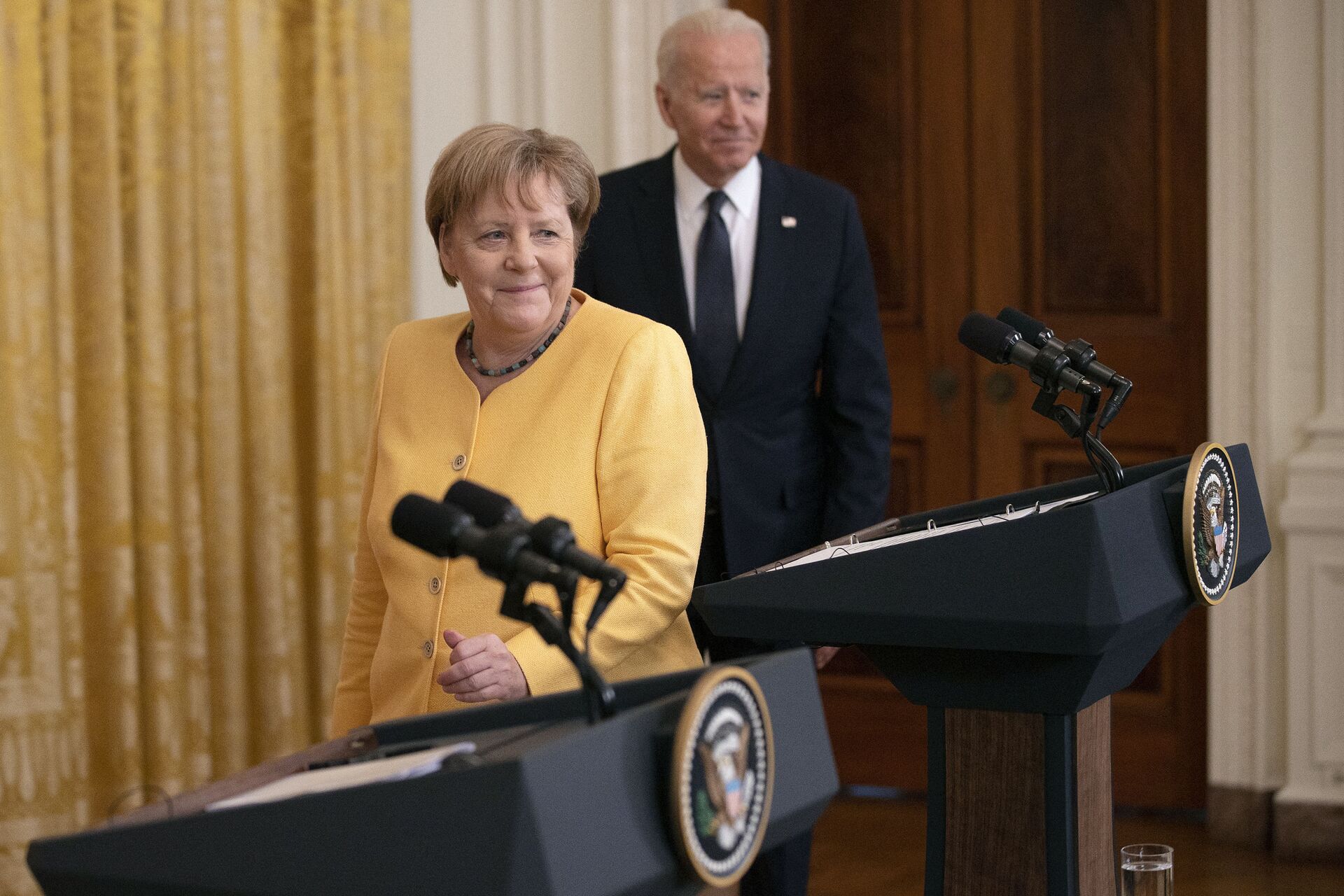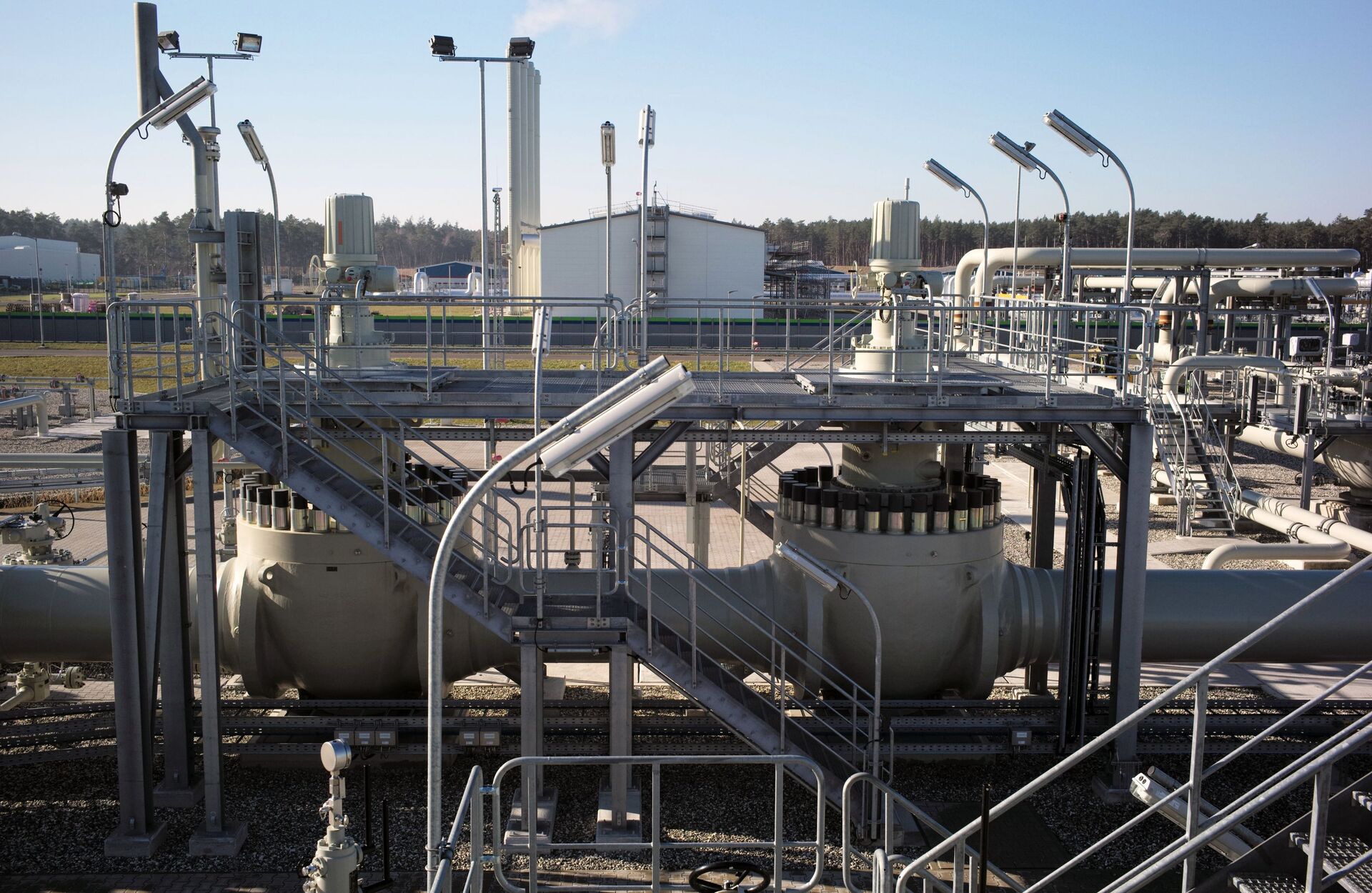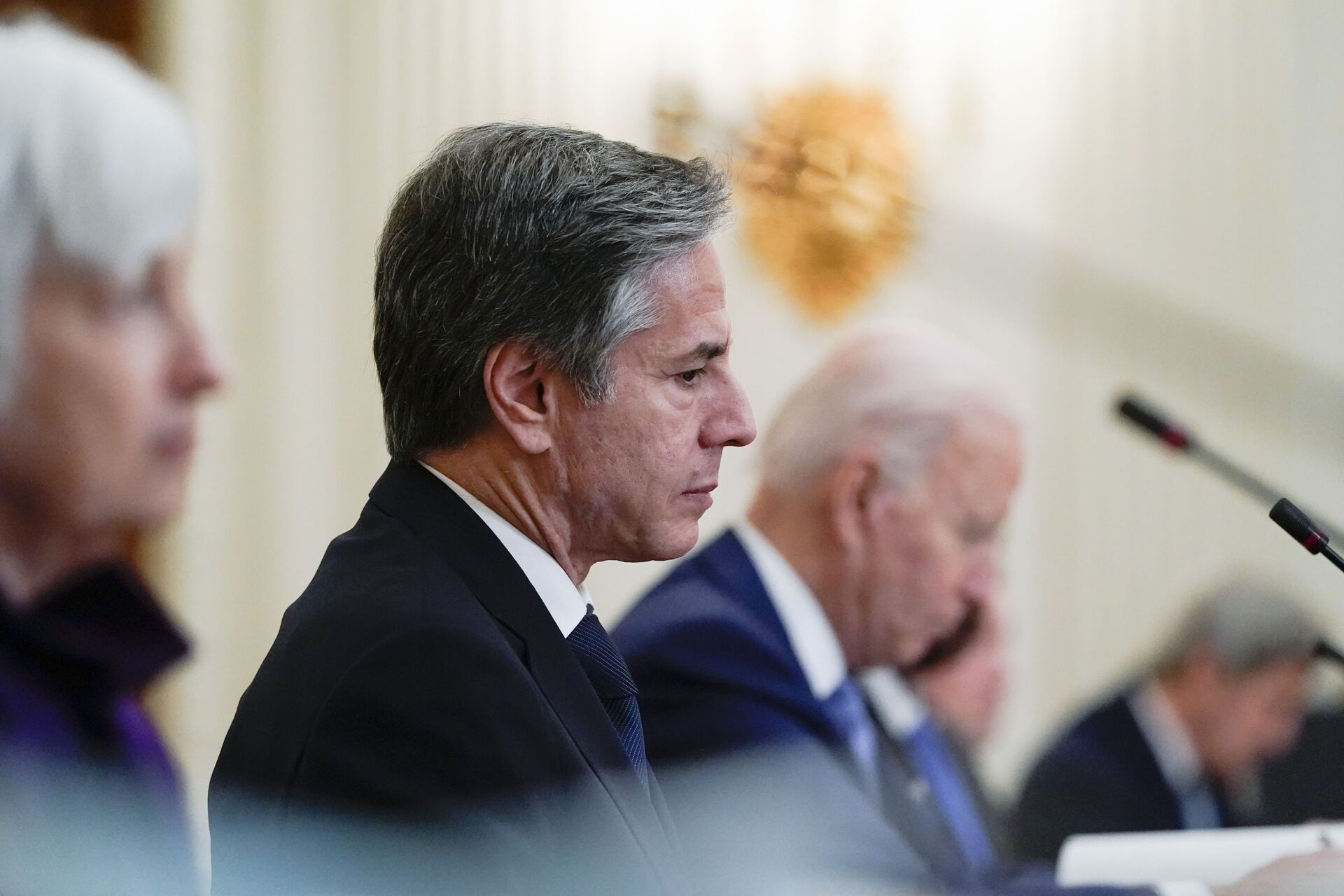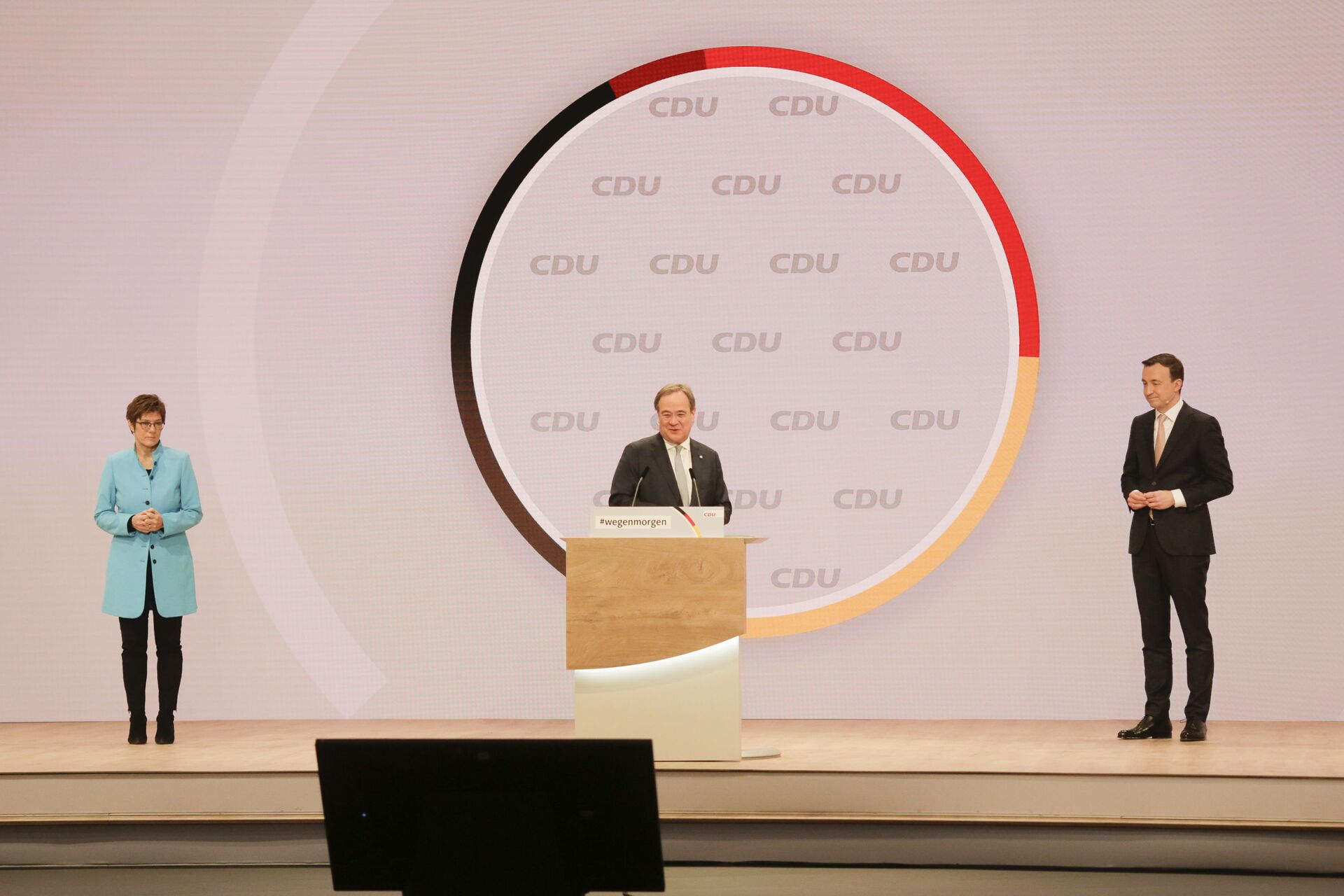Why US-Germany Deal on Nord Stream 2 is a Face-Saving Move Veiling Washington's Defeat
16:00 GMT 21.07.2021 (Updated: 21:18 GMT 19.10.2022)

© Sputnik / Sergey Guneev
/ Subscribe
The US-Germany deal on the Nord Stream 2 project aimed at increasing the capacity of the initial Nord Stream gas pipeline running from Russia to Germany to 110 billion cubic metres (3.9 trillion cubic feet) is expected to be announced as early as on Wednesday, The Wall Street Journal reported on 20 July.
According to the draft deal, obtained by Bloomberg, Washington and Berlin would threaten sanctions and other retaliation if Russia "tries to use energy as a weapon against Ukraine", with Germany being obligated to take unspecified actions in the event of Russian "misbehaviour".
Earlier, Joe Biden and Angela Merkel failed to resolve their differences over the Nord Stream 2 pipeline. The two agreed that the transit route through Ukraine for Russian gas should continue to operate, but according to Merkel, they came "to different assessments as to what this project entails". Professor Glenn Diesen of the University of South-Eastern Norway has explained what is behind the US-Germany row is.
Sputnik: Why have the US and Germany failed to reach common ground on Nord Stream 2 for such a long time?
Glenn Diesen: Germany has traditionally argued that managing relations with Russia requires economic cooperation, while the US seeks to marginalise the role of Russia in Europe with economic containment and coercion. These different approaches merely reflect the different national interests of Berlin and Washington that continue to become more divergent as relative economic power shifts to the East.
Both Berlin and Washington recognise that hegemony in Europe require the West to assert asymmetrical interdependence with Russia – by increasing Russian economic reliance on the West and reducing the West’s dependence on Russia.
Germany therefore argues that Nord Stream 2 preserves Western influence by keeping Russia economically connected to Europe as opposed to Russia continuing its geoeconomic drift to the East, while the US sees Nord Stream 2 as a threat by elevating Russian influence in Europe.
Both Berlin and Washington are correct in their assessment as Nord Stream 2 will provide Russia with a footprint in Europe, yet by continuing to cut Russia’s economic links with Europe the consequence is less reliable and affordable energy for the Europeans while Russia aligns itself even closer with China.

German Chancellor Angela Merkel (L) and U.S. President Joe Biden take the stage for a joint news conference in the East Room of the White House on July 15, 2021 in Washington, DC. During what is likely her last official visit to Washington, Merkel and Biden discussed their shared priorities on climate change and defense; and Biden voiced his concerns about the Nord Stream 2 Russian natural gas pipeline.
© AFP 2023 / CHIP SOMODEVILLA
Sputnik: Why does Berlin have to ask for Washington's permission to buy natural gas from Russia while several decades ago, West Germany resolutely rejected the Reagan administration's attempts to stop a Euro-Soviet gas pipeline project? Has Germany been losing its sovereignty since then?
Glenn Diesen: Germany is in a much stronger position today than it was back in the days of the Reagan administration. However, as the dominant economic position of the US weakens in the world, Washington becomes more willing to use economic coercion against its allies to uphold their geoeconomic loyalty. Germany demonstrated it would complete Nord Stream 2 irrespective of US sanctions, which was a clear repudiation of Washington’s efforts to limit its sovereignty. Although, the sanctions evidently failed as the pipeline is nearing completion, and it is therefore in the common interest of both Berlin and Washington to improve trans-Atlantic relations by ending the sanctions. Thus, Berlin asks Washington for permission, and Washington accepts under certain conditions.

Construction of the Nord Stream 2 gas pipeline in Germany
© Sputnik / Ekaterina Solovieva
/ Sputnik: The Biden administration waived sanctions on the firm behind the gas project, Nord Stream 2 AG, and its chief executive, Matthias Warnig. At the same time, Secretary of State Antony Blinken stated in June that the pipeline project was a Russian tool for the coercion of Europe and signalled that the US has leverage against it. What's behind Washington's mixed signals with regard to the project? How could they throw sand in Nord Stream 2’s gears, in your opinion - or are Blinken's threats empty?
Glenn Diesen: The mixed signals demonstrate that the completion of Nord Stream 2 was a defeat for the US. Biden confirmed that he waived sanctions because the project was near complete. Sanctions could not stop the project, rather they would merely continue to worsen relations with Berlin and Moscow. The best approach for Washington at this point is to recognise that Nord Stream 2 is a done deal, and instead Washington will direct its focus towards limiting the geoeconomic consequences of the pipeline by obtaining commitments from Berlin such as preserving Ukraine’s role as a transit state.
The US therefore waives sanctions against Nord Stream 2, yet threatens new sanctions if Berlin fails to accept US conditions and limitations on Nord Stream 2. Blinken’s threats are loaded with “strategic ambiguity”, which could be aimed to conceal that they are merely empty threats. However, strategic ambiguity is also conducive to prevent Berlin from calculating the “costs” and possible remedies to US threats. Furthermore, ambiguity can be ideal in terms of how to respond as it is not a good look to continuously threaten allies.

Secretary of State Antony Blinken and President Joe Biden. May 2021. File photo.
© AP Photo / Alex Brandon
Sputnik: Angela Merkel won't take part in the 26 September elections and will step down this year. Is it possible that the Biden administration does not want to strike a long-term anti-Russia strategy with the outgoing chancellor?
Glenn Diesen: The US may renew the discussions of a common anti-Russian strategy with the next administration. However, I do not expect great changes after September as Germany have different economic and strategic considerations than the US. The US seeks to strengthen European confrontation against Russia, and to extend the same trans-Atlantic model against China. Washington’s vision of a new Cold War of liberal democracies versus authoritarian states is designed to marginalise adversaries and make allies more dependent. This would make the German economy less competitive and excessively reliant on the US.
In this new Cold War, Europe as a divided continent would become less and less relevant in the world as the Europeans must lean on the US and Russia lean towards China. It is simply in the interest of both Germany and Russia to strengthen economic connectivity in Europe to decentralise power away from Washington and Beijing.

The new elected Christian Democratic Union, CDU, party chairman Armin Laschet, center, speaks as outgoing chairwoman Annegret Kramp-Karrenbauer, left, and Secretary General Paul Ziemiak listen, after the voting at a digital party convention in Berlin, Germany, Saturday, Jan. 16, 2021. The party of German Chancellor Angela Merkel decided on a successor for the outgoing chairwoman Annegret Kramp-Karrenbauer, left, at the convention.
© AP Photo / Markus Schreiber
Sputnik: The Western media has named several possible successors of Merkel, including "pro-Russia and pro-China" Armin Laschet and "trans-atlanticists" Friedrich Merz, Norbert Röttgen, and Robert Habeck (or Annalena Baerbock). What's your prognosis on the outcome of the battle for the chancellorship and how could it affect the course of Europe's Russia strategy?
Glenn Diesen: Germany’s Green Party with its leader Annalena Baerbock appeared to be rising towards power for a while. This is an extremely Russophobic and ideological political party that would result in a fiercely anti-Russian position. However, the Green Party has recently reduced its position in the polls. Germany is at a crossroads and the election could indicate the future path of Europe. If an “anti-Russia and anti-China” successor takes over, then Europe will lose its strategic autonomy and withdraw under US patronage, while a “pro-Russia and pro-China” successor would weaken the collective voice of the West as the US is mobilising for another Cold War.
Glenn Diesen is the author of "Russian Conservatism: Managing Change under Permanent Revolution" (2021), "Great Power Politics in the Fourth Industrial Revolution: The Geoeconomics of Technological Sovereignty" (2021), "Russia in a Changing World" (2020), "The Decay of Western Civilisation and Resurgence of Russia: Between Gemeinschaft and Gesellschaft" (2018), and "Russia's Geoeconomic Strategy for a Greater Eurasia (Rethinking Asia and International Relations)" (2017).

